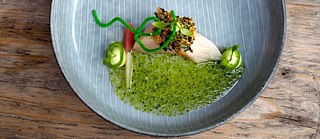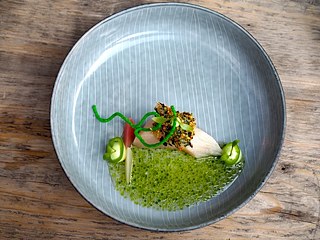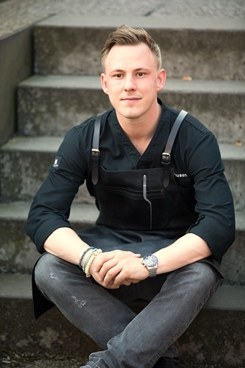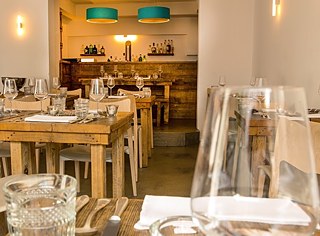Culinary Harbour Cities
Sustainability as a business concept – the “Jellyfish” restaurant

This idea had been simmering away in Heuke Neubecker’s mind for many years, until the time came to put it down in writing. He had sold his marketing agency two years before, taken some paternity leave, done a world trip, and was on a diving trip somewhere in the Indian Ocean, off the Thai coast, when he finally grabbed a pen and jotted down the details of his idea: a fish restaurant that would only serve sustainably caught fish.
“I had always felt a real affinity with the sea and its flora and fauna. I am also a fanatical diver, and I am fascinated by the underwater environment”, he says. “And I love eating seafood and fish, preferably sitting barefoot on a sandy beach.” But this fish restaurant was going to be something very special, based on a clearly defined concept and value proposition. The result was the ”Jellyfish”, which he now operates with his business partner, Jens Paulsen.
The restaurant concept is strictly applied – the establishment will not serve any fish that has been caught by large trawler vessels. Also off limits are aquaculture, which often have very high stocking rates, and fish caught with drag nets, which churn up the sea bed. “As a diver, I am all too familiar with the damage caused by fishing. And there are quality issues as well: fish caught in large nets often get crushed, which makes the flesh mushy, and can even cause haematomas”, he says.
Instead, the “Jellyfish” only serves fish caught by natural methods, preferably from small boats, with hand-held lines. “A bass caught in this way might weigh six kilos. And we can trace its origins all the way back to the angler who caught it”. Many restaurants serve a whole bass for less than 20 euro, as compared with the “Jellyfish”’s price of 50 euro for a dish with just part of the fish.
Along with the strict criteria applied in terms of products and ingredients, Neubecker insists on the very highest culinary standards. “Right at the start, I set the goal of having a Michelin star, 16 points in Gault Millaut, and being among the top 300 restaurants in Germany”, he says. The “Jellyfish” is well on the way towards achieving these targets, with 15 points in Gault Millaut. It earned a Michelin star in 2017.
How important is the location close to the port of Hamburg part of the restaurant’s success? Not at all, says Hauke Neubecker. The days when fishing boats brought their freshly caught fish up the Elbe to the fish auction shed are long gone, he points out. These days all the product is flown or trucked off to the city. So while fish are still unloaded and transhipped here, it is no longer a matter of fishermen spilling their valuable cargo out onto the quay.
But Neubecker has no plans to impose even stricter criteria on the business, by only buying freshwater fish and fish caught in German waters. “I don’t want to limit myself, there is so much amazing stuff out there in the ocean”, he says. And what does he think of the fish purchasing guidelines put out by the WWF and Greenpeace? “If we followed their recommendations, we would end up only eating carp, which doesn’t seem very realistic”. Yet he believes the guidelines play an important role by making people aware of the fishery issue. “Otherwise our thoughtlessness will eventually result in empty plates on the table”, he says.
Neubecker himself prefers to stay in the background. He will not agree to be photographed, and leaves the stage to 30-year-old chef Stefan Barnhusen. How does the latter translate Neubecker’s formula into creative, original cuisine? With dishes such as kingfish tartare with wasabi avocado espuma, raw marinated hamachi with leek vinaigrette and jalapeno mayonnaise, or steamed Irish rock oysters with a ‘pearl’ of oyster mousse, fennel cream, algae and seaweed. The quality is superb, so much so that the Der Feinschmecker (= the Gourmet) magazine recently rated the “Jellyfish” as Germany’s best fish restaurant. So the recipe of sustainability plus gourmet cuisine seems to be a winning combination.





